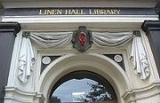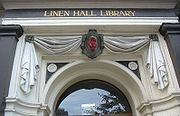
Linen Hall Library
Encyclopedia

Belfast
Belfast is the capital of and largest city in Northern Ireland. By population, it is the 14th biggest city in the United Kingdom and second biggest on the island of Ireland . It is the seat of the devolved government and legislative Northern Ireland Assembly...
, Northern Ireland
Northern Ireland
Northern Ireland is one of the four countries of the United Kingdom. Situated in the north-east of the island of Ireland, it shares a border with the Republic of Ireland to the south and west...
. It is the oldest library
Library
In a traditional sense, a library is a large collection of books, and can refer to the place in which the collection is housed. Today, the term can refer to any collection, including digital sources, resources, and services...
in Belfast and the last subscribing library
Subscription library
A subscription library is a library that is financed by private funds either from membership fees or endowments...
in Northern Ireland. The Library is physically in the centre of Belfast, and more generally at the centre of the cultural and creative life of the wider community. It is an independent and charitable body.
Early history
The Linen Hall Library is a unique institution. It was founded in 1788 by a group of artisans as the Belfast Reading Society and in 1792 became the Belfast Society for Promoting Knowledge. It adopted a resolution in 1795 "that the object of this Society is the collection of an extensive Library, philosophical apparatus and such products of nature and art as tend to improve the mind and excite a spirit of general enquiry". It began to acquire books (with a particular focus on those relating to Irish topics, publishing, for example Ancient Irish Music by Edward BuntingEdward Bunting
Edward Bunting was an Irish musician and folk music collector.-Life:Bunting was born in County Armagh, Ireland. At the age of seven he was sent to study music at Drogheda and at eleven he was apprenticed to William Ware, organist at St. Anne's church in Belfast and lived with the family of Henry...
in 1796) and also other items which could be used to advance knowledge. The society declined in the later 1790s however, as it owned no permanent premises and struggled with official attempts to control radical thought, though it survived a crackdown after the 1798 rebellion thanks to the efforts of Rev. William Bruce.
In 1802 the Library moved into permanent premises in White Linen Hall
Linen Quarter, Belfast
Linen Quarter is the area of Belfast south of Belfast City Hall bounded by Donegall Square South, Bedford Street, Ormeau Avenue and Cromac Street...
(from which it took its name, though legally it is still the Belfast Society for Promoting Knowledge). The Library struggled, however, through most of the 19th century. It became more conservative, attempting to exclude students from Queen's College
Queen's University of Belfast
Queen's University Belfast is a public research university in Belfast, Northern Ireland. The university's official title, per its charter, is the Queen's University of Belfast. It is often referred to simply as Queen's, or by the abbreviation QUB...
and debating whether or not to include fiction.
As the Library's centenary approached it was hit by another setback as it lost its premises in White Linen Hall to make way for the construction of the new City Hall
Belfast City Hall
Belfast City Hall is the civic building of the Belfast City Council. Located in Donegall Square, Belfast, County Antrim, Northern Ireland, it faces north and effectively divides the commercial and business areas of the city centre.-History:...
. The Library moved into a warehouse in Donegall Square
Donegall Square
Donegall Square is a square in the centre of Belfast, County Antrim, Northern Ireland. In the centre is Belfast City Hall, the headquarters of Belfast City Council. Each side of the square is named according to its geographical location, ie Donegall Square North, South, East and West. It is named...
(previously used for linen), which was designed by Charles Lanyon
Charles Lanyon
Sir Charles Lanyon DL, JP was an English architect of the 19th century. His work is most closely associated with Belfast, Northern Ireland.-Biography:Lanyon was born in Eastbourne, Sussex in 1813...
and his firm
Lanyon, Lynn and Lanyon
Lanyon, Lynn & Lanyon, Civil Engineers and Architects was a 19th-century firm working mainly in Dublin and Belfast, and the leading architectural firm in Belfast during the 1860s. Its partners were Charles Lanyon, William Henry Lynn, and Charles' son John Lanyon.Charles Lanyon was the head of the...
, and which the Library occupies as of 2009. At the same time it made the transition from being a private company to one with public duties with regard to care for its collections. This was also a period when the Library became much more ambitious, collecting books with a new vigour and implementing many cultural programmes.
In the Interwar period
Interwar period
Interwar period can refer to any period between two wars. The Interbellum is understood to be the period between the end of the Great War or First World War and the beginning of the Second World War in Europe....
the Library's success continued as the public library system was slow to develop and even after World War II
World War II
World War II, or the Second World War , was a global conflict lasting from 1939 to 1945, involving most of the world's nations—including all of the great powers—eventually forming two opposing military alliances: the Allies and the Axis...
it was a hub of creativity in Northern Ireland. It failed to secure this position, though and in the years following began to decline. Investment in public libraries combined with extensive IRA
Provisional Irish Republican Army
The Provisional Irish Republican Army is an Irish republican paramilitary organisation whose aim was to remove Northern Ireland from the United Kingdom and bring about a socialist republic within a united Ireland by force of arms and political persuasion...
bombing in the city centre led to membership levels falling. By the end of the 1970s the Library was on the brink of closure, with large amounts of material (including an extensive collection relating to The Troubles
The Troubles
The Troubles was a period of ethno-political conflict in Northern Ireland which spilled over at various times into England, the Republic of Ireland, and mainland Europe. The duration of the Troubles is conventionally dated from the late 1960s and considered by many to have ended with the Belfast...
) but a poor building, few users and serious money problems. In response, the Department of Education threatened to withdraw its grant and in 1980 proposals were made to close the Library permanently.
Later history
After 1980 a fight began to save the library. It was decided that it should begin to allow and encourage free public reference access and to concentrate particularly on Irish studies, politics and culture, both because it was already strong in these areas and so as not to compete with the expanded Central Reference Library. The move was a success. The number of subscribers began to increase and the library increased its role as a cultural centre, both facilitating research and fostering close links with the wider community.It quickly became apparent that lack of space was holding back the library's revival. After spending ten years exploring various options before purchasing a 999-year lease
Leasing
Leasing is a process by which a firm can obtain the use of a certain fixed assets for which it must pay a series of contractual, periodic, tax deductible payments....
on the upper floors of some neighbouring property in 1996. This was followed by an extensive fundraising campaign to pay for the development of this new property. Construction began in 1999 and was completed in time for the opening on September 16, 2000.
In 2000 former IRA hunger strike
Hunger strike
A hunger strike is a method of non-violent resistance or pressure in which participants fast as an act of political protest, or to provoke feelings of guilt in others, usually with the objective to achieve a specific goal, such as a policy change. Most hunger strikers will take liquids but not...
r Jackie McMullan
Jackie McMullan
Jackie "Teapot" McMullan is a former volunteer in the Provisional Irish Republican Army who took part in the 1981 Irish hunger strike.-Background and IRA activity:...
helped to organise the transfer of the IRA prisoners' library of books from the former HM Prison Maze, with a view to setting up a lending library for former prisoners.
Material
In addition to providing a free public reference service and a general lending service for both adults and children the Library also houses several special collections. It is the leading centre for "Irish and Local Studies" in Northern Ireland which includes its comprehensive stock of "Early Belfast and Ulster printed books", periodicals and newspapers dating back as far as 1738 and a wide variety of archive and manuscript material. It also contains an extensive collection of maps (some of great historical interest) and extensive materials in the Irish languageIrish language
Irish , also known as Irish Gaelic, is a Goidelic language of the Indo-European language family, originating in Ireland and historically spoken by the Irish people. Irish is now spoken as a first language by a minority of Irish people, as well as being a second language of a larger proportion of...
. Its "Northern Ireland Political Collection" collected since 1968 contains 250,000 items and is the definitive archive of the recent troubles, containing material looking at all sides of the conflict. It also houses collections devoted to genealogy
Genealogy
Genealogy is the study of families and the tracing of their lineages and history. Genealogists use oral traditions, historical records, genetic analysis, and other records to obtain information about a family and to demonstrate kinship and pedigrees of its members...
, the poet Robert Burns
Robert Burns
Robert Burns was a Scottish poet and a lyricist. He is widely regarded as the national poet of Scotland, and is celebrated worldwide...
and Northern Irish performing art.

